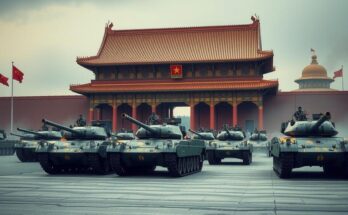Turkey and Iran’s longstanding tensions are intensifying as they compete for influence in Syria and Iraq, shaken by recent political changes. Turkey asserts a newfound assertiveness post-Assad, while Iran strives to challenge this perception of weakness. Both nations are leveraging regional dynamics, risking the potential for wider instability amid historical rivalries. A careful balance is needed to prevent escalating conflicts from spilling over into broader geopolitical arenas.
Turkey and Iran are experiencing heightened tensions as they vie for regional influence in Syria and Iraq following significant changes in their power dynamics. This shift is characterized by Turkey’s increasing assertiveness and Iran’s diminishing foothold, particularly after the fall of Bashar al-Assad’s regime. Recent Iranian criticism of Turkey’s Syria policies, along with Turkish Foreign Minister Hakan Fidan’s stern warning against interference in domestic affairs, has intensified this rivalry.
Historically, Turkey has viewed Iran’s tactics as destabilizing. The 2015 meeting between King Salman of Saudi Arabia and President Erdoğan resulted in the idea of a united Sunni front to address Tehran’s sectarian agenda; however, Turkey’s dependency on Iranian energy hampered its full commitment to this alliance. Currently, Turkey is less dependent on Iran and is capitalizing on this shift to pursue its foreign policy aims in the region.
In the current landscape, Turkey is focused on stabilizing Syria to strengthen its political, economic, and defense ties. Simultaneously, Ankara is eager to benefit from a weakened Iran in Iraq. As the U.S. plans to withdraw troops from Iraq, Turkey anticipates gaining a more substantial influence over Baghdad.
Conversely, Iran seeks to undermine this perception of vulnerability by exhibiting readiness to confront Turkey. Supreme Leader Ayatollah Khamenei’s advisor’s public rebuke of Fidan aims to assert Tehran’s stance. Iranian media has issued warnings against Turkish support for separatist movements within Iran, indicating a potential escalation of internal unrest that could threaten Turkey’s domestic stability.
Analysts in Tehran express concern over perceived Ottoman nostalgia in Ankara’s ambitions, asserting that Turkey’s regional strategies may have historical implications for Iran. This includes fears of Turkish intelligence supporting anti-Iran groups and claims of a broader Turkish effort to extend soft power into Iran.
In the context of Syria, while Iran’s position has weakened, it still possesses tools to challenge Turkey’s intentions. Conflicting messages from Iranian officials about future involvement in Syria display uncertainty but indicate some potential for renewed efforts to maintain influence. Ankara remains acutely aware of Iranian capabilities to disrupt its plans and has suggested that recent sectarian violence correlates with Tehran’s interventions.
Iraq remains another critical front where Iran and Turkey’s interests collide. Turkey aims to develop economic and infrastructural projects while Iran maintains significant political presence in Baghdad. Turkish-Iranian tensions hinder efforts at establishing stability in Iraq, as both nations vie for influence without ceding ground.
Despite their mutual tensions, Iranian officials believe in the possibility of de-escalation with Turkey, indicating a careful balancing act is necessary amid greater geopolitical struggles against the U.S. and Israel. Turkey, feeling empowerment from its recent regional standing, seeks improved relations but is prepared to confront challenges from Iran if necessary.
While a direct conflict is unlikely, the competition between these two nations compounds the risks of proxy wars extending into new territories, potentially escalating in areas such as the South Caucasus and Central Asia. Both countries face pressures that could reinstate a zero-sum rivalry reminiscent of the volatile period following the Arab Spring, a situation regional powers are eager to avoid.
In summary, the escalating tensions between Turkey and Iran reflect a complex backdrop of shifting power dynamics in the region. Both nations engage in a struggle for influence, particularly in Syria and Iraq, with each balancing opportunities and risks. While direct conflict remains improbable, the stakes are high as the potential for proxy competition could lead to wider regional instability. It is crucial for both Ankara and Tehran to navigate this rivalry cautiously to avert a significant escalation that could disrupt the delicate regional balance.
Original Source: www.mei.edu




